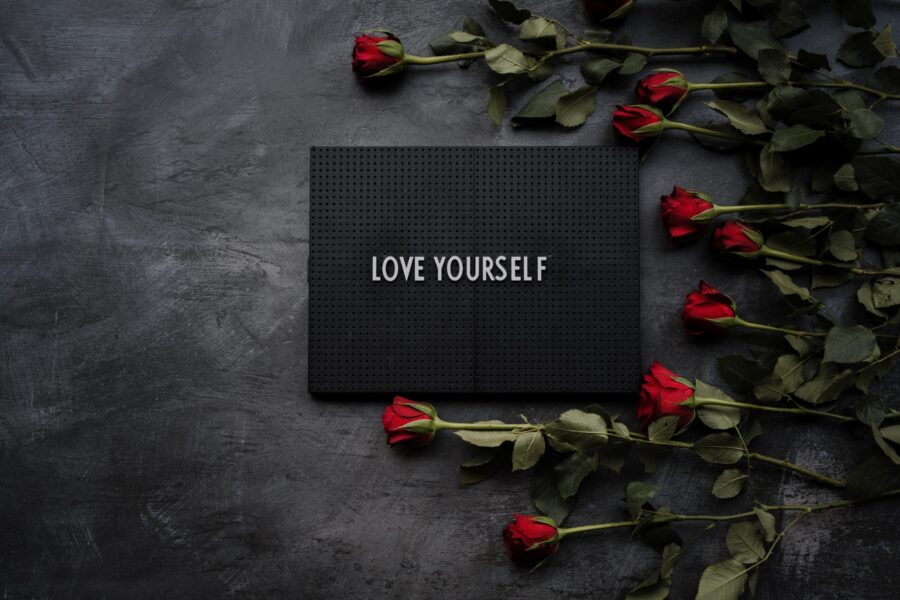Tips for Nurturing Your Most Important Relationship
Be honest. Have you ever found yourself thinking thoughts like these?
- Who could ever love me?
- I am a (insert derogatory) person.
- I always (insert negative).
- I never (insert positive).
According to Dr. Michelle Maidenberg in an article for Psychology Today, “we often make broad generalizations about who we are, how we function, and how we think, feel, and behave.” These negative pronouncements lead us to desire to cut off those aspects of ourselves we find uncomfortable or to avoid or deny them altogether.
Unfortunately, by doing so, instead of freeing ourselves of negatives, we engage with them more intensely, leading to frustration and inevitable disappointment. “Often to our chagrin, we recognize that no matter how hard we try, we are fundamentally who we are, and our thoughts and feelings are what they are,” Maidenberg explains, which “keeps us in the cycle of self-loathing and self-hating.”
We wouldn’t treat someone else we love with loathing. It’s time to be compassionate toward ourselves, she argues. “It is the self-loathing part that needs the most empathy and kindness. If it were approached with compassion there would be more openness and opportunity for flexibility, leaning in, working on, developing, evolving, and growth.” Research on self-compassion demonstrates that it boosts our “health, relationships, motivation, self-confidence, self-fulfillment, resilience, and emotional balance.”
She offers tips for self-love and self-compassion, excerpted here:
- Reject labels and broad generalizations about yourself. Be conscious when you apply them. Stick to thoughts in the present circumstance. Say to yourself, “My mind is being so negative right now” rather than “I’m so negative.”
- Embrace your humanity. Like all other humans, you are imperfect. You will view some aspects of your personality or character more favorably than others. You are a work in progress.
- Avoid comparing yourself to others. “The goal isn’t to be a different you, but rather to be more like you, and your very best self,” she encourages.
- Recognize that even when you have an emotional moment – feeling worried, angry, emotionally sensitive – that causes you distress, you do not have to act on that thought or feeling. You get to decide how you behave. “You can make a decision or choice that is well thought out, processed, and mindful, and is in line with being your best you.”
- Acknowledge that those feelings (worry, anger, emotional sensitivity) are often rooted in experience in your past. “That part of you is likely to be something you have been challenged with since your childhood,” she explains.
- When you encounter a challenging or uncomfortable part of yourself, something you consider unlovely, show yourself kindness and compassion. Maidenberg adds, “With imagery, you can imagine hugging that part, saying something compassionate to it, and/or inviting it in to gently and kindly just be with you without wishing it were absent or trying to push it away.”
- Mindfully ask yourself, “What am I experiencing right now?” and “How am I thinking and feeling about it?” Compassionately ask yourself, “What do I need right now?” and “How will I be kind to myself when I suffer?” Beating ourselves up when we are suffering only adds to our anguish. Work to ease it instead.
She ends with this important reminder:
“Take the time to be compassionate toward yourself. The longest relationship that you will have with anyone is the one you have with yourself. You are worth all your time, efforts, and love — because you truly matter.”
For more tips on self-love and self-compassion, read Dr. Maidenberg’s full article here.
Maidenberg, Michelle P., Ph.D., MPH, LCSW-R, CGP. “The Power of Self-Love and Self-Compassion: 10 tips to enhance your longest relationship – the one you have with yourself.” Psychology Today, 14 Feb 2021, https://www.psychologytoday.com/us/blog/being-your-best-self/202102/the-power-self-love-and-self-compassion.
Photo by Annie Spratt on Unsplash



